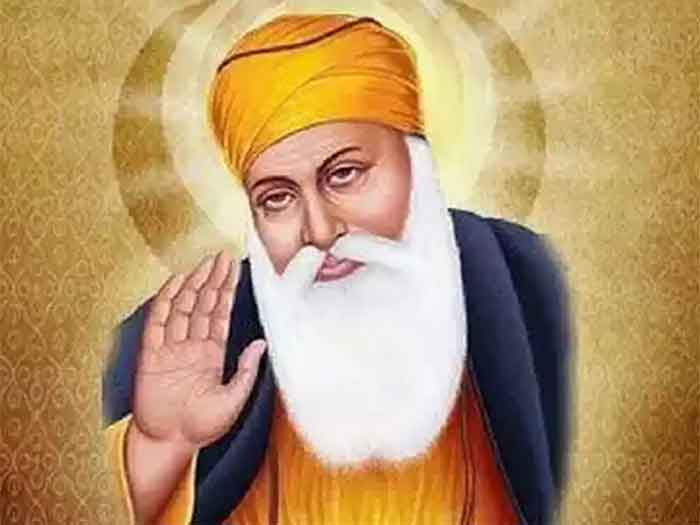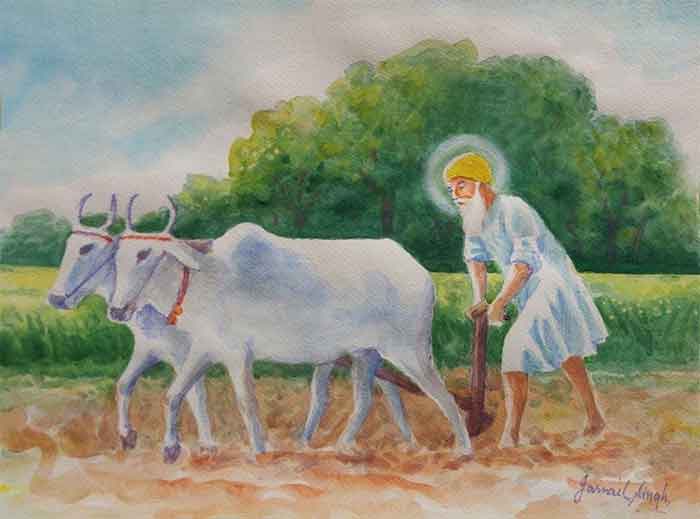
November 19, Friday is Guru Nanak Jayanti.
The great saints of Bhakti movement combined in their personality and work very precious aspects of social reform and deep spirituality. Their message of social reform was often much ahead of their times and the strength of deep spirituality was needed to take this forward. When confronting tyrants and oppressors Guru Nanak and Sant Kabir were completely fearless and this great courage came from their deep spirituality. They had searched for truth, they had found truth and they felt that their devotion to God, as they honestly and sincerely followed the path shown by God, was their best protection. Thus in their tireless pursuit of great challenges they had endless courage.
Those were times when the region known today as South Asia, or its neighborhood, was dominated by two great religions of Hinduism and Islam, although of course there were people of other religions too. The two main religions had their different sects too. It was important for safety, welfare and progress of people from the various religions and sects to live in harmony with each other. Unfortunately there were people who took a narrow sectarian and even fanatic view of religion and problems of conflict arose mainly due to these people. This reality remains as true today as it was then.
In such conditions it was nothing short of initiating a social revolution to say loud and clear to everyone that the narrow religious identity is not the main identity of people, and what really matters is an ethical life. This was the stand taken by great reformers like Guru Nanak and Sant Kabir. Both of them had followers among Hindus as well as Muslims and accepted both with equal grace and love.
They spread new ideas that it is not particulrly important if a person is born in a Hindu or a Muslim family or a family of some other religion. The rituals that a person follows are also not of any great importance. What is really important is that people should lead their life according to certain ethical norms which are in conformity with creating a world of peace, harmony and justice. Clearly in this world there is no place for inter-faith or inter-sect conflict. Hence in troubled times Guru Nanak and Sant Kabir tried to take people to a stage where inter-faith conflict bcomes irrelevant and even even narrow religious identity becomes a non-issue. On the other hand ethical issues become more important and trying to conceal ethical misconduct under the shadow of narrow ritualism and fanaticism gets exposed. This is needed even more today than at that time.
Another reality of those times which remains equally oppressive today is the reality of caste and hierarchy. Guru Nanak, Sant Kabirdas, Sant Ravidas, Meerabai and some other greats of the bhakti movement rejected caste and hierarchy. This is how Meerabai, from royal family and warrior caste, could de-class herself so nobly and regard a dalit saint as her spiritual teacher.
Guru Nanak openly declared his closeness and sympathy for those who are regarded as the lowest of the low in hierarchy ridden society. He said he would happily accept the simple food and hospitality of an affectionate poor disciple regarded to be of low caste by society but he would not accept the rich feast offered by a high-caste aristrocrat who was known for his oppression of poor people. Thus Guru Nanak struck at the roots of caste and hierarchy. Both he and Sant Kabir completely rejected he path adopted by most other ‘holy’ men of the day of propagating caste, hierarchy and associated rituals and instead asked people to move away from all this towards a life based on peace, justice, harmony, devotion, love and compassion.
While taking up such big and courageous tasks and challenging established, well entrenched unjust, undemocratic, oppressive and violent thinking, a spirit of complete devotion to God is very helpful and this merges very closely with the search of truth. This deep spirituality keeps one firmly on the path of truth, overcoming all fear and avoiding all distraction.
A question remains whether all those who proclaim themselves as followers of Guru Nanak and Sant Kabir really follow the essence of their teachings as some of them too seem to be affected by narrow religious prejudice, sectarianism and even fanaticism at times, or else appear to belive in casteism, hierarchy, accumulation of more and more material wealth and greed. On the other hand Guru Nanak and Sant Kabir believed strongly in simplicity and avoiding greed. In fact although there was no environmentalism at that time in the present sense, but the values spread by them are very much in tune with the needs of environment protection.
It may also be unconventional to speak of human rights activism in those times but giving specific examples we can nevertheless say that one of the most inspiring aspects of Guru Nanak’s life and work was his work as a human rights activist. While returning from one of his all too frequent travels, near Aminabad he came to know of the extreme distress of civilians taken as prisoners by an invading army. Guru Nanak protested against this even in those times of ruthless rulers and their arbitrary actions. The impact of his spiritual strength and fame based on this was such that many prisoners were actually released. But Guru Nanak stayed on for extra time to ensure that they were not troubled again.
Guru Nanak rejected the exaggerated rituals of various religions, their claims to be the only truth and the strong tendency on the part of religious leaders to carve out a dominant and often lucrative position for themselves. Instead he emphasized spirituality based on a simple and ethical life and direct closeness or bhakti to God based on such a life. Compassion and truth were much more important for him compared to any rituals and fasts which were emphasized by so many other preachers.
As Guru Nanak was travelling very frequently to new places and inter-acting with strangers, he developed exceptional skills for getting across his point of view even among hostile people in new areas. Quite often when he wanted to oppose some hypocrisy or ritual, he achieved this not by raising a shrill voice against this ritual, but by quietly playing the role of a very innocent person who just could not comprehend or understand the logic or rationality of an empty ritual or a false belief.
For example when he wanted to oppose the ritual of offering water to dead parents at a pilgrimage site, he simply stood in the opposite direction to pour water. As he had anticipated, immediately everyone started shouting at him that he was offering water in the wrong direction. Nanak now played the innocent to perfection and said, “My parents are not dead. They live in a village located in this direction. I thought after looking at all of you that if water poured by you can reach heaven which must be very far away, then surely water poured by me will reach my parents living in my village which is relatively nearer.” Everyone started laughing instead of getting angry, but in a subtle way Nanak had told them about the absurdity of the ritual.
Similarly in another instance when he was very tired in the course of his travels, he fell asleep with his feet placed unintentionally towards a place of worship. He was rudely awakened by a narrow minded religious leader who ordered him to immediately remove his feet from the position that pointed towards the place of worship. Nanak did not move but very calmly told the aggressive man, “I am not aware of any direction where God does not exist. If you know such a direction then kindly move my feet towards that direction.” The aggressive man did not have a reply to this and lurked away ashamed.
Of course Guru Nanak is worshipped today by countless people, but one wonders whether his most essential message of peace, equality, non-discrimination, simple and ethical life , compassion and opposition to exploitation is really getting the attention it badly needs in our troubled world. If India remembers the essential message of the great saints of bhakti and sufi movements like Guru Nanak and Sant Kabir, this will help the country to get its basic priorities right.
Bharat Dogra is Convener of Save the Earth Now Movement . He has also contributed short biographies of social reformers, spiritual leaders and freedom fighters. His recent books include Planet in Peril and Man over Machine.












































